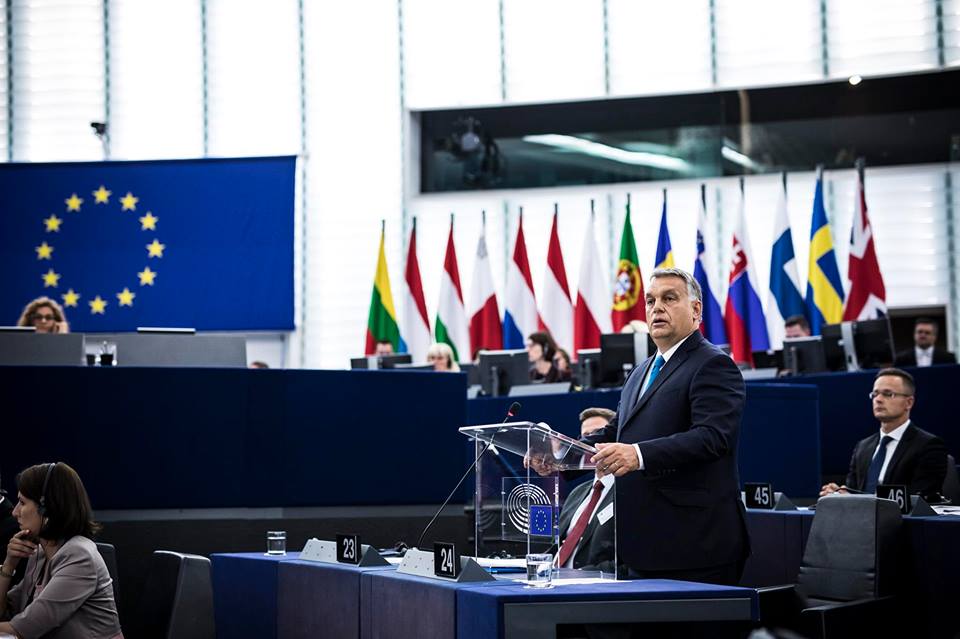Poland/Hungary – Polish MEP Radosław Sikorski, who is the head of the EU-US delegation in the European Parliament, a member of the Polish Civic Platform (PO), and PM Donald Tusk’s former foreign minister (2007-2014), recently claimed that Hungarian Prime Minister Viktor Orbán is in agreement with President Vladimir Putin regarding the “partitioning of Ukraine”. According to Sikorski, Hungary’s goal is to recover the territories of Subcarpathia populated by ethnic Hungarians.
According to a report aired on the TVN24 news channel and shared by Sikorski, the Russian secret services have already begun a disinformation campaign aimed at the inhabitants of Subcarpathia, and the Hungarian populations in Ukraine allegedly have the goal of seceding from Ukraine and, potentially, reuniting with Hungary.
Radosław Sikorski in the vein of Roman Giertych’s ramblings
Sikorski’s comments follow statements made by Roman Giertych, a Polish former deputy prime minister (2006-2007), on 17 March. These comments were reported by several Polish media outlets as well as the Hungarian opposition’s press. In a piece entitled “Orbán’s Plan”, Giertych put forward the hypothesis that there is a secret plan between Poland, Hungary, and Russia for the partitioning of Ukraine. It is in light of this alleged plan that Giertych interprets Budapest and Warsaw’s alliance against the European Union.
According to Giertych, this plan called for a rapid invasion of eastern Ukraine by Russia, followed by a march on Kiev to topple President Zelensky and his government. The Hungarian and Polish armies were allegedly supposed to then occupy Ukraine’s territory west of the Dnieper – that is, in those regions hostile to Russia – which would have forced the division of the country and de facto created Polish and Hungarian “protectorates” in western Ukraine.
Giertych believes that this plan has failed because, according to him, the Russian military operations did not go as planned and faced unexpected resistance from the Ukrainians. Thus, the “betrayal of the century” did not occur. Since the Russians failed to take Kiev in their initial blitzkrieg campaign, Kaczyński and Orbán were unable to rush in to seize Lwów (Lviv in Ukrainian) and Ungvár (Oujhorod in Ukrainian)!
Without promoting nebulous conspiracy theories like Giertych’s, Sikorski did, however, go so far as to claim that Hungary and Russia are on the same page concerning Ukraine. Relaying a report by TVN24, this MEP from Donald Tusk’s PO party endorsed the theory that the process of Hungarian Subcarpathia’s secession has already begun through subversion by the Russian secret services aimed at influencing the local population in favour of the supposedly imminent territorial upheavals. Hence, Donald Tusk’s former minister also believes that Moscow’s operation is a good thing for Hungary, as the latter can take advantage of the troubled situation caused by the war in Ukraine.
These remarks seem so far removed from the reality of relations between Moscow and Budapest, from the limits of Hungarian diplomacy, and from the actual situation in Subcarpathia that they caused Zsolt Németh, a Fidesz MP chairing the Foreign Affairs Committee in Parliament, to joke that Sikorski had probably drunk too much vodka, and that it was “probably Russian, not Polish vodka”.
The Sikorski-Applebaum power couple
Radosław Sikorski and Anne Applebaum have been married since 1992. Applebaum is an American journalist who also holds Polish citizenship. In September 2021 she participated in the Conference on Sustainable Democracy organised by the municipality of Budapest and its eco-socialist mayor Gergely Karácsony, as well as George Soros’ Central European University (CEU).
This meeting of intellectuals and progressive politicians turned out to be an anti-Orbán forum intended to support Budapest’s mayor, who was then considered as the most likely prime ministerial candidate on the common opposition’s list, a role that eventually fell to Péter Márki-Zay.
Among those taking part, there was also the American sociologist and political scientist Larry Diamond, former advisor to the US’ Coalition Provisional Authority in Iraq and former co-director of the International Forum for Democratic Studies; the Vice President of the European Commission for Values and Transparency, Věra Jourová; British historian Timothy Garton Ash; American political scientist Charles Gati; and Ukrainian-born British political scientist Peter Pomerantsev, the man who invented the term “post-modern dictatorship” to describe contemporary Russia.
An expert in “civil society” in post-Communist Europe, Applebaum is a member of the Washington Post’s editorial staff and has also worked with various American think tanks, including the American Enterprise Institute for Public Policy Research (AEI) and Legatum. In 2016, she supported Hillary Clinton against Donald Trump in an article entitled “Why we need a President Clinton”https://www.washingtonpost.com/opinions/global-opinions/why-we-need-a-president-clinton/2016/07/28/aaa40e76-54ef-11e6-bbf5-957ad17b4385_story.html, in which she drew parallels between Trump, Putin, China, and Iran.
In December 2018, in an interview given to the Hungarian website Válaszonline.hu, Applebaum’s husband, Radosław Sikorski, stated while answering a question about Crimea and Donbass that some members of the Hungarian ruling class had plans to revise Europe’s borders:
“Poland, unlike Hungary, thinks that changing national borders by force would be a terrible idea. Hungary has a different position, as some of [its] politicians would not be opposed to border changes in Europe. (…) A significant part of the Hungarian leadership is still traumatised by Trianon.”
In that interview, Sikorski also outlined his vision of the anti-Soros campaign being led by the Hungarian government, using the same self-righteous tone that his wife often assumes:
“For me, the straw that broke the camel’s back was the defamation of George Soros, using methods reminiscent of the twentieth century and which we should never repeat.”




